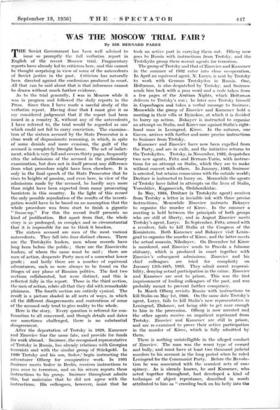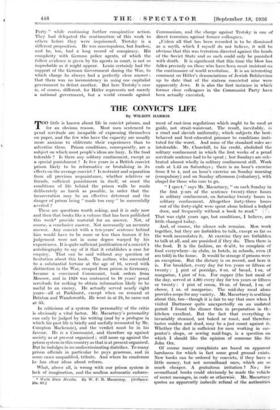WAS THE MOSCOW TRIAL FAIR ?
By SIR BERNARD PARES THE Soviet Government has been well advised to issue so promptly the full verbatim report in English of Ilie recent Moscow trial. Fragmentary reports have already led to criticism here, and this cannot be thought surprising in-view of some of the antecedents of Soviet justice in the past.- Criticism has naturally been directed against the confessions produced in court. -All that can he said about that is that inferences cannot be drawn without much further evidence.
As to the trial generally, I was in Moscow while it was in progress and followed the daily reports in the Press. Since then I have made a careful study of the- verbatim report. Having done that -must give -it as my considered judgement that if the report had been issued in ,a country X, without any of the antecedents, I have referred to, the trial would be regarded as one which could not fail to carry conviction. The examina, lion of the sixteen accused- by the State Prosecutor is a Close work of dispassionate reasoning, in which, in spite of some denials and more evasions, the guilt of the accused is completely brought home. The act of indict.- ment, which is very full and covers thirty pages, frequently Cites the admissions of the accused in the preliminary examination, but does not in itself present any difference from what procedure might have been elsewhere. It is only in the final speech of the State Prosecutor that he rises to- heights of passion, and even here, in view of the admissions made by the -accused, he hardly says more than might have been expected from many prosecuting barristers in this country; In the- light of this record the only possible repudiation of the results of the investi- gation would have to be based on an assumption that the whole ,procedure was from start to finish a gigantic frame-up." For this the record itself presents no kind of justification. But apart from that, the whole story is so prolonged, so complex and so-circumstantial that it impossible for Me to think it baseless.
The sixteen accused are- men of the most various antecedents. They fall into four distinct classes. There are the Trotskyite leaders, men whose records have long been before the public ; there - are -the Zinovievite leaders, -of whom the same must be said ; there are men of action, desperate Party men -of a somewhat lower grade ; and lastly there are a number •of equivocal adventurers, such as were always to- be found on the fringes of any phase of Russian politics. The first two sections collaborated, but were distinct, and this is reflected fully in the report. Those in the third section, theinen of action, relate all-that they did with ;remarkable plainness. The fourth' section are entirely cynical. The result is a pletUre shaded in all sorts of ways, in which all the different disagreements and contentions of some of the accused only tend to give reality to the whole.
Here is the story. Every question is referred-for con- firmation to 'all Concerned, and though details and dates are sometimes challenged, there is no substantial disagreenient.
After the aeportation of Trotsky- in 1928, Kamenev and Zinoviev 'fear the same- fate, and provide for -funds for work abroad. Srnirnoi, the-recognised- representative of Trotsky in Russia, has already relations with Georgian terrorists and with the- sinniar group of Stfickgold. In 1980 Trotsky and his son, Sedov,' begin instructing the adventurer Olberg for conspirative work.- In 1931 Smirnov meets- Sedov in Berlin, receives -instructions to pass Over to terrorism, and on his return reports -these instructions to his group. Smirnov throughout- admits this, but maintains that he did not .agree with the instructions: His colleagues, however, insist that he took an active part in carrying them out. Olberg now goes to Russia with instructions from Trotsky, and th'e Trotskyite group there recruit agents for terrorism.
The group of Trotsky and that of Zinoviev and Kamenev in the summer of 1932 enter into close co-operation. In April an equivocal agent, N. Lurye, is sent by Trotsky to work with German Trotskyites in Russia. One, Holtzman, is also despatched by Trotsky, and Smirnov sends him back with a pass word and a code taken from a few pages of the Arabian Nights, which Holtzman delivers to TrotSky's son"; he later sees Trotsky himself in Copenhagen and takes a verbal message to Smirnov.
• Meanwhile the group of Zinoviev and Kamenev hold a meeting in their villa at Ilyinskoe, at which it is decided to hurry up action. Bakayev is instructed to organise an attempt on Stalin, and Karev one against Stalin's right- hand man in Leningrad, Kirov. In the autumn, one Gaven. arrives with further and more precise instructions to Smirnov from Trotsky.
Kamenev and Zinoviev have now been expelled from the Party, and are in exile, and the initiative returns to the Trotskyites. Trotsky, in November, 1932; despatches two new agents, Fritz and Berman-Yurin, with instruc- tions for an attempt on Stalin, which they are to make without concert with others. In January, 1988, Smirnov is arrested, but retains connexions with the outside world ; Dreitzer is instructed to hurry on. Meanwhile the agents of Trotsky have failed in attempts on the lives of Stalin, Voroshilov, Kaganovich, Ordzhonikidze.
In May, 1984, Dreitzer (a Trotskyite agent) receives from Trotsky a letter in invisible ink with three precise instructions. Meanwhile Zinoviev instructs Bakayev to organise the murder of Kirov. In the summer a meeting is held between the principals of both groups who are -still at liberty, and in August Zinoviev meets Trotsky's agent, Lurye. In September, Fritz, armed with a revolver, fails to kill Stalin at the Congress of the Komintern. Both Kamenev and Bakayev visit' Lenin- grad to organise the murder of Kirov, and the latter meets the actual assassin, Nikolayev. On December 1st Kirov is murdered, and Zinoviev sends to Pravda a fulsome obituary, which is produced in court together with Zinoviev's subsequent admissions. Zinoviev and his chief colleagues are tried for complicity on January 15th-16th, 1935. They admit moral responsi- bility, denying actual participation in the crime. Zinoviev and Kamenev are sent to prison. This was the first imprisonment of leading colleagues of the past, and was probably meant to prevent further conspiracy.
In March Olberg revisits Russia with instructions to Mil Stalin on May 1st, 1936. On the same date Trotsky's agent, Lurye, fails to kill Stalin's new representative in Leningrad, Zhdanov, not being able to get near enough to him in the procession. Olberg is now arrested and the other agents receive an impatient reprimand from Trotsky. Zinoviev and Kamenev are still in prison; and are re-examined to prove their active participation in the murder of Kirov, which is fully admitted by them. - There is nothing unintelligible in the alleged conduct of Zinoviev. The man was the worst type of coward and bully; and must have at least two thousand judicial murders-to his account in the long period when he ruled Leningrad for the Communist Party. Before the Revolu- tion he was associated with the seamiest acts of con' spiracy.. As is already known, he- and Kamenev, who acted together throughout, had developed a kind of technique of abject repentance, described in words attributed to him as " crawling back on his belly into the Party " while continuing further conspirative action: They had delegated the continuation • of this work • to others before they were imprisoned. Trotsky is a different proposition. He was unscrupulous, but fearlesk; and he, too, • had a- long record of conspiracy. His complicity - with German police agents, of which the fullest evidence is given by his agents in court, is not so improbable as it might appear. Lenin certainly had the support of the German Government during the War, to which charge he always had a perfectly- clear answer : that there was - no inconsistency in using one capitalist government to defeat another. But here Trotsky's case is, of course, different, for Hitler represents not merely a national government, but a world crusade against Communism, and the charge against Trotsky is one of direct terrorism against former colleagues.
,,-"Unless all that has been recorded is to be dismissed as a- myth, which I myself do not believe, it will be obvious that this was terrorism directed against the heads of the Soviet State and as such could only be punished with death. It is significant that this time the blow has fallen precisely on those who have been most insistent on the continuance of world revolution. It is an interesting comment on-Hitler's denunciations of Jewish Bolshevism up to date that of the sixteen convicted nine were apparently Jews. It is also the first instance in which former close colleagues in the Communist • Party have been actually executed.











































 Previous page
Previous page